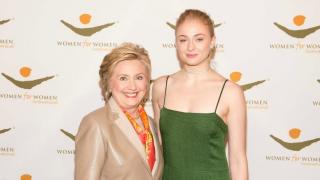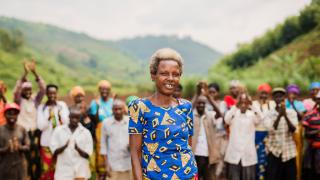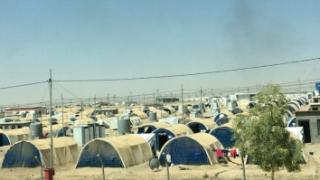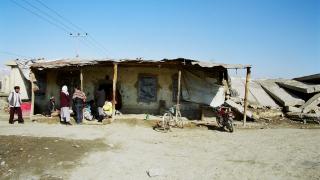"Women’s Rights is the Unfinished Business of the 21st Century"
Secretary Hillary Rodham Clinton sat down with CNN’s Chief International Correspondent Christiane Amanpour at our annual Luncheon, which raised $1.2 million for women survivors of war. They discussed the importance of women's involvement in peace and security around the world.
Women's equality is everyone's business
After more than four decades of working on gender equality, Secretary Clinton said that while we have made some progress, there is still a long way to go and she is ready to get back to working on women’s empowerment. “There is still so much inequity, so much unfairness, so much disrespect and discrimination towards women and girls. So, have we made progress, yes we have, but have we made enough? No. And it’s not a minor issue, it’s not a luxury issue you get to after everything else is resolved, it is central to the maintenance, stability, sustainability of democracy, of human rights,” Secretary Clinton said.
From working towards equal pay in the United States to ensuring that more women are involved in decision-making and peace processes around the world, our fight for equality is far from over. “Women’s rights is the unfinished business of the 21st century. There is no more important or larger issue that has to be addressed,” Secretary Clinton said as she urged the continuing investing in women’s rights.
Secretary Clinton argued that investing in women’s rights and in development is not only right, but it is also beneficial to the world as it promotes peace and prosperity. She spoke about Women for Women International as a successful example of what empowering women to promote peace around the world looks like.

Working with Women for Women International
“During the course of my years of working on behalf of these issues, this organisation is one that has been one that has really produced results. I want everybody here who is supporting it to know, you really make a difference and your contributions, your front-line work help change lives. Hundreds of thousands of women have been helped through Women for Women’s efforts and you being here today helps keep that process going,” she told an audience of more than 540 guests and supporters of Women for Women International.
With the support of people around the world, Women for Women International has been able to serve more than 462,000 women survivors of war in Afghanistan, Bosnia-Herzegovina, Democratic Republic of Congo, Kosovo, Nigeria, Rwanda, South Sudan and The Kurdistan Region of Iraq. With a long-term vision for sustainable change and development, we work with the most marginalised and socially excluded women so they have the skills, networks, and tools they need to rebuild their lives, communities, and nations.
“Historically, Women for Women International has worked in some of the most difficult places in the world, conflict zones, post-conflict zones, places where violence, particularly violence against women and children is a threat to everyone—and they go on year after year into these places to support women, to give women a voice, to give women job training, to give women access to markets, to try to ensure that women are represented when there are conversations about peace or trying to end the violence that afflicts their community or their nation,” Secretary Clinton said.
Join us in moving forward
We agree with Secretary Clinton that now is the time to invest in women’s rights globally. As we see conflict disproportionally impacting women from South Sudan to Iraq, we must make sure that we don’t turn our backs to the most marginalised women in our world. Join Women for Women International and help us rebuild communities after war and conflict and provide women with the tools they need to change their lives.
Continue Reading
Humanitarianism: A Daily Workout
subtitle:
This World Humanitarian Day, we are reminded of our shared responsibility to support those caught up in global crises. Find out three ways you can exercise your humanitarianism from our Executive Director, Brita Fernandez Schmidt.
Katie shares her experience in Erbil, Kurdistan Region of Iraq.
Engaging Men to Make a Difference
subtitle:
Special insight from Ghulam Rabi, a men's engagement programme graduate from Afghanistan.



